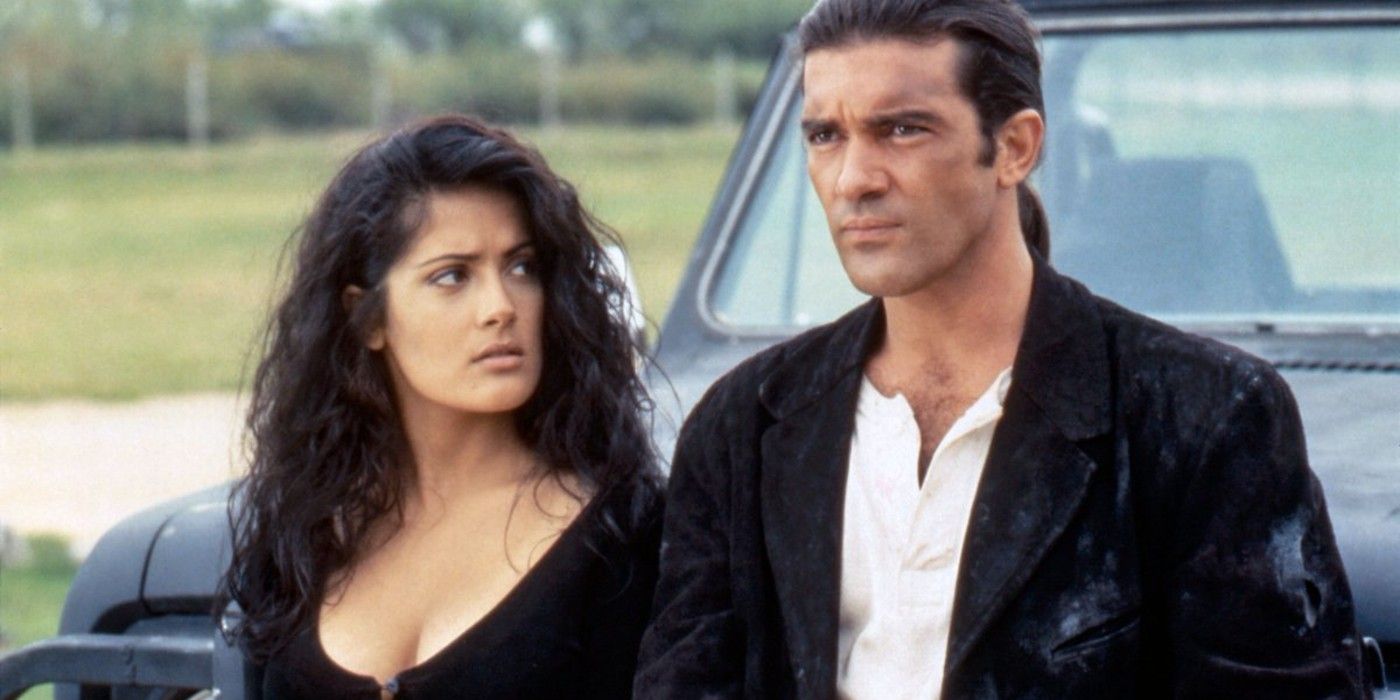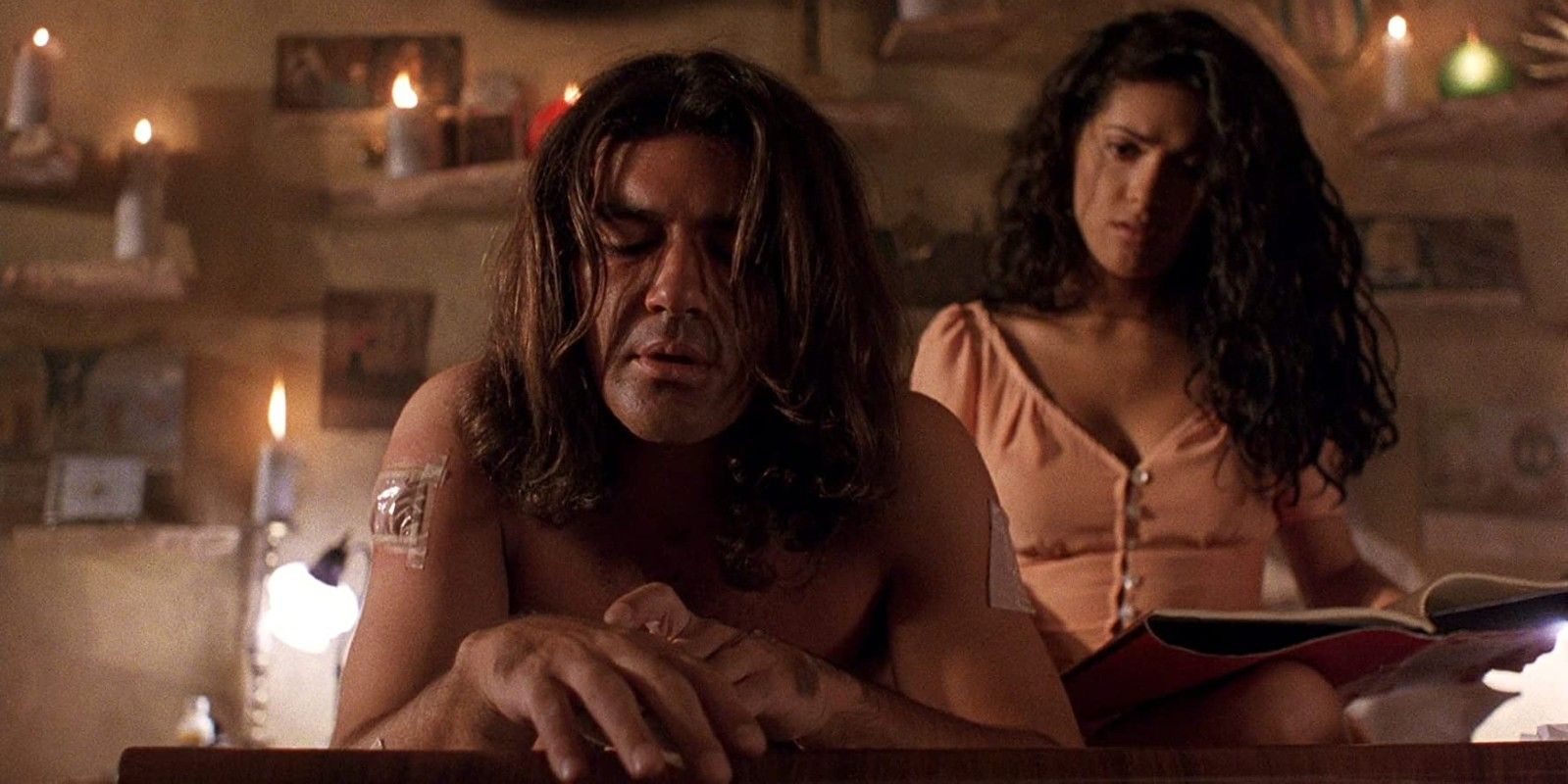In a recent podcast interview, actress Salma Hayek discussed struggling while filming the sex scene in the 1995 film Desperado. The film, directed by Robert Rodriguez, was the second installment in his “Mexico Trilogy,” which also includes the films El Mariachi and Once Upon a Time in Mexico, colloquially known as Desperado 2.
Desperado tells the story of a vigilante in Mexico named El Mariachi, played by Antonio Banderas, who is looking for vengeance on a drug kingpin who murdered his lover. Though it has a different cast, the film is a continuation of Rodriguez’s 1992 film El Mariachi. Hayek plays Carolina, El Mariachi’s newfound love interest. Together they evade capture, bullets, and death, though not without pain and loss of their own. The film was a breakout role for Hayek, being her first big Hollywood film.
Desperado was also a very graphic film, obviously including a lot of violence. However, it was the film’s sex scene that troubled Hayek. In a recent interview on the podcast Armchair Expert with Dax Shepard and Monica Padman, Hayek opened up about her traumatic experience filming the scene. She reveals that the love scene was not originally in the script, but was “demanded by the studio when they saw the chemistry” between Hayek and Banderas. She notes that even though Banderas and Rodriguez were wonderful about the situation, she still found it unsettling.
“The wife of Robert Rodriguez [the producer, Elizabeth Avellán], at the time, became my best friend. Robert Rodriguez, thank God, can also do everything on a film set… He can do the sound, he can operate the camera, and he was like my bro. So they closed the set and it was Robert, Elizabeth, Antonio, and I.”
Hayek admits that this was nice, but because she hadn’t don’t anything like this before, so when shooting started she “started to sob,” repeating “I don’t know if I can do this” and “I’m afraid.” She cited Antonio’s free spirit as a part of what scared her.
“He was an absolute gentleman and super nice and we’re still very close friends. But he was very free. So, it scared me that for him…it was like nothing. And that scared me because I’ve never been in front of someone like that in that situation. And I started crying and he’s like, “Oh my God, you’re making me feel terrible.” I was so embarrassed that I was crying.”
Hayek continued, stating that "they were great but I was not letting go of the towel.” Banderas, Rodriguez, and Avellán tried to make her laugh to get her to take it off, but as soon as she did she began crying again.
Hayek makes it clear, however, that Banderas and Rodriguez were “amazing” and “magnificent” and that neither of them ever put pressure on her. Hayek also revealed that the scene was comprised of such quick cuts because of her trouble filming and because she couldn’t stay in the scene. Hayek admits that, even now, she can’t enjoy that scene while watching it.
She also touches on the double standards placed on women, by admitting that a part of the reason why she couldn’t get into character to get through it is that she was thinking about her father and brother. When the movie came out, she told them they couldn’t watch the scene and escorted them out of the theater for its duration. She said they were incredibly supportive, but she and Shepard commented on the unfair pressures put on women to not only respect themselves but also protect the egos and reputations of the men in their life.
While not foreign to the world of Hollywood, more and more celebrities are opening up about their traumatic experiences being vulnerable—and in the worst cases, harassed or assaulted—on sets. It’s important to hear these stories so that Hollywood can change and adapt. By employing intimacy coordinators and other on-set safety measures, Hollywood has taken steps to ensure experiences like Hayek's on the set of Desperado aren't repeated, so hopefully the industry will continue to grow and adapt.
Source: Armchair Expert


